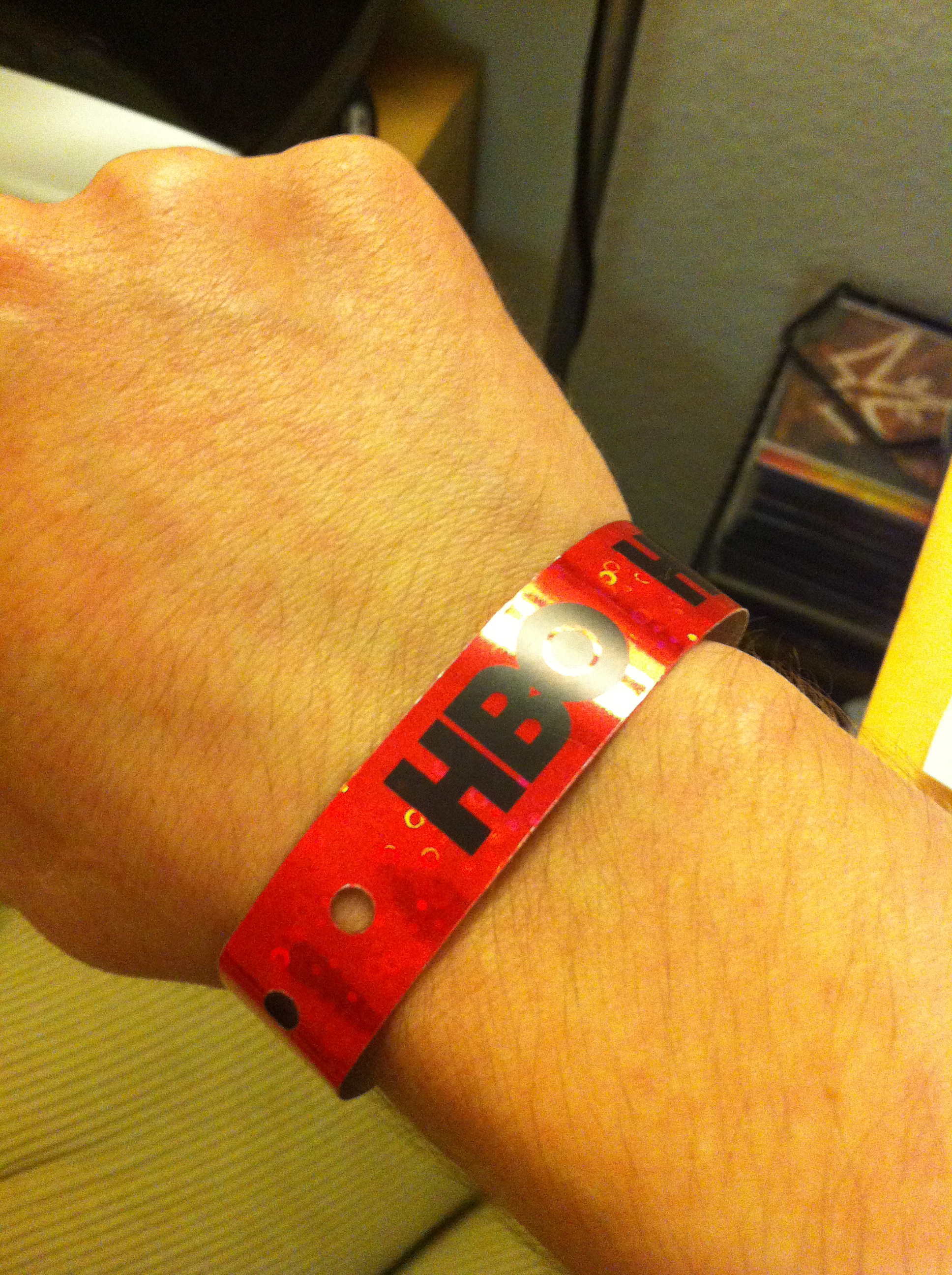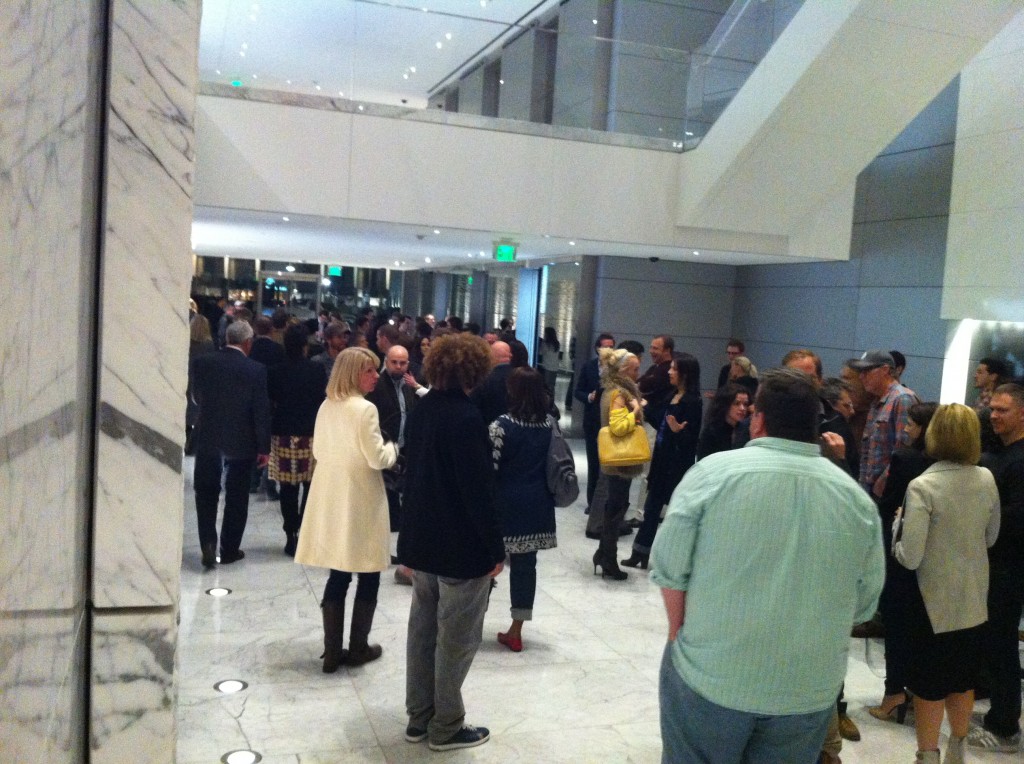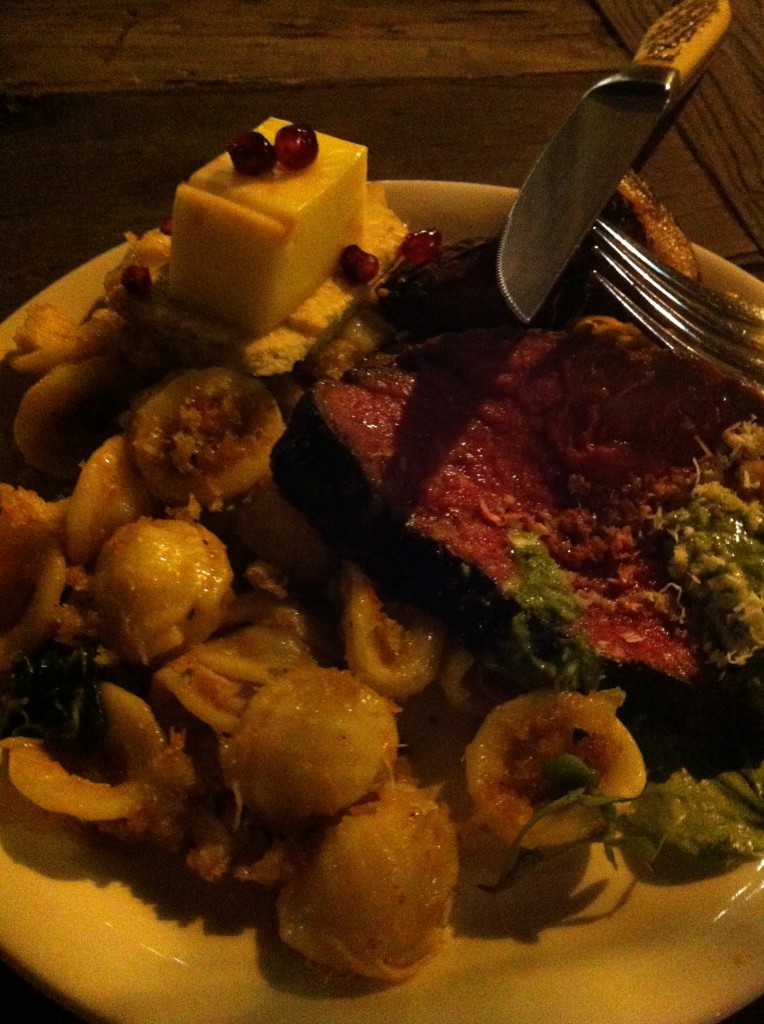Tonight I went to the season 2 cast and crew premiere event for Game of Thrones in LA. It’s a great venue (the Ray Kurtzman Theater at CAA), of course, and a fun time out, but it’s also nice to see people I mainly communicate with via e-mail face to face—though, as usual, I forgot to get pictures. However, you can see Bryan Cogman in this shot:
Last time we saw the first two episodes of season 1; this time we just the first episode of season 2. But…man! These guys do good work. I won’t give anything away, but one thing viewers will notice at the very beginning: Peter Dinklage’s name has moved on up to the east side, as it were (when the first episode airs, compare it to the season 1 intro). Granted, some of the names that were ahead of his aren’t around any longer, but nonetheless, it’s well-deserved!
After the screening was over, there was an after party, and as I was waiting to get my car, I finally had a chance to chat face-to-face with the man himself, khali khali (or perhaps khal khaloa?), zhey Drogo: Jason Momoa.
So, I knew Jason Momoa was buff; we’ve seen that. I don’t think I fully appreciated just how tall he was. Check out this photo:
And hes’ not even standing up tall! Bet that dude could dunk if he put his mind to it. After that one, he said we should make angry, Drogo faces. The result:
It’s an iPhone camera, so we looked at the picture afterwards, and Jason’s exact words were, “Dude, you look constipated!” Yeah… Oops! Truth is, I just couldn’t do an angry face, because I was so floored to be meeting and talking to Lisa Bonet (i.e. Denise). I mean, I grew up with The Cosby Show: That family feels like they’re real to me! I didn’t say anything (after all, every one of the main cast members has heard every comment and question in the world about The Cosby Show ten billion times over), but I couldn’t keep my face from smiling.
At the after party at The Eveleigh, there was legitimate full-course dinner food there, as well as appetizers (which I was grateful for, since I hadn’t eaten much that day). Here’s what I had:
See how red that meat is?! Man, that was good! So that got me to thinking: How would you characterize rare vs. well-done meat in Dothraki? Not an easy question. In my experience, those who live in the Midwest (of America) on farms and actually have a hand in the whole food preparation process only eat well-done meat. Ask for something rare in their presence, and they’ll give you a look like you just stepped out of a chicken. (Think about that one for a minute.)
While the Dothraki are preparing their own meat, I can’t help but think they wouldn’t share this prohibition (I wanted to say superstition, but I’m sure farm people have good reasons for distrusting rare meat [and I’m sure I don’t want to know what those reasons are]). After all, they have pregnant women eat a raw horse’s heart which has just been ripped from a live horse’s body—and they think this will help the fetus, as opposed to lead to salmonella, or something. So “raw” probably isn’t the word for it.
Looking over the vocabulary, I already have words that I think will cover one scale—both vegetation and meat:
- chosh “fresh” ~ rikh “rotten”
This is one scale (the “how likely is this to be bad?” scale), and I think it works fine for meat. So chosh can cover “raw” or “rare”, depending on the circumstance. In addition to this, though, there’s also the heating scale. Given what we see of the Dothraki, it doesn’t seem to me like they’ve invested a lot in slow-cooking or baking: it’s probably burnt or not burnt. Given those two extremes, going by the color of the meat seems like a good way to characterize the meat:
- virzeth “red” ~ kazga “black”
So if you ever get a Dothraki waiter, you’ve got two options: che gavat virzeth che gavat kazga. And to me it seems likely that, in the world of Dothraki cuisine (to the extent that that phrase even makes sense), it’s not the case that there’s a dish and you decide how “done” you like your meat—rather, there are dishes where the meat will be virzeth, and dishes where the meat will be kazga, and switching them doesn’t make sense (like if you ordered chicken parmigiana and you got steak parmigiana instead of chicken: it’s just a different dish). That’s my read. What do you think? (Actually, I wonder what they’d think over at The Inn at the Crossroads…)





It would be interesting to hear from someone who is skilled at cooking horse meat. That could probably give some clues as to how horse meat differs from other types of meat and from that it might be possible to deduce how the Dothraki would likely treat their cooking.
Then again the Dothraki seem to eat lots of different meat, even dogs, so they probably have a wide range of experiences with cooking meat.
True, but certainly horse meat is the chief meat. I do feel like I’m missing something since I have no experience with it at all (either on the eating or preparing end of it).
Did you have time to talk to Jason about the language at all? Does he still remember any of his lines?
He does. He can kind of slip right into his Dothraki voice, which is cool, since his English-speaking voice is ordinary. We didn’t talk much about the language qua language, but about stuff in general; it was fun. He was in a good mood.
And you didn’t ask him about any of his adlibs? Did you ever decide what that first line at the wedding in episode one should mean?
That line? Yeah, don’t you remember? We talked about it on IRC. It’s Itte oakah! It means something like “Test your might”. And, yeah, I should’ve told him about the words his ad libs gave rise to; didn’t think of it. Next time?
Well, when we talked about it in the IRC we never ended up deciding on anything so we left it unresolved and then never came back to it.
A lot of cultures do have methods of cooking where they surround/cover something in coals overnight (or afternoon, or morning) to cook it, the campfire equivalent of a crock-pot. Anything done this way would be pretty well cooked thru by morning I would think. Also you can bake in a similar way, with a covered pot with thick sides, this seems less likely to me because where are they getting/manufacturing flour in a khalasar?
Like in Hawai’i. I guess the question is is this type of baking likely given the climate and terrain…
Perhaps it could be possible if some of the grass types on the Dothraki Sea was actually some type of wild growing grain.
Oh no you misunderstand, I’m sure that the dothraki could make flour, it can be made out of grains or a variety of tubers and nuts, and there’s always pillaging it!
The thing flour is relatively heavy, doesn’t travel all that well (sacks or casks and they leak constantly) and to make your own on the go from roots and tubers means you have to carry grinding instruments with you, given the technology level of the dothraki mortars and pestels are going to be heavy and a tax on the horses that I doubt the results would justify (especially when you can eat the same tubers roasted or stewed….)
The abscence of bread/grain from the Dothraki would explain why they are so lean and trim. A high protein low carb diet. They probably wouldn’t eat much rice either because it takes a lot of water to grow.
Being generally nomadic in their khalasars, I would think that most cookery would be of the fast variety, and would be chunks of meat roasted over a fire. Cooking meat this way usually results in something that has various states of doneness, depending on how thick it is, its fat content, etc. Although I am sure they know the art, slow cooking of meat would be reserved for events like weddings, etc, where they might roast an entire horse or other large animal in a pit or on a spit. As mentioned, meat cooked this way is usually well done. But this cooking method also tends to result in tender, juicy meat.
‘Red’ and ‘black’ are interesting terms to describe the doneness of meat. ‘Red’ is OK for rare or raw (and like you, I like rare meat and occasionally even eat beef raw). But cooked meat is brownish gray, except where it might be burnt on the outside. (Most of the time, you aren’t usually going to get too much charring on the outside of a piece of meat unless you are going for well-done) Even a piece of cooked rare meat is going to be grayish-brown on the outside (at least for dark red meats, like beef, horsemeat, lamb/mutton or venison). So, I would consider using shiqeth or nozhoven to describe well-done meat. Now, I wonder if you would use a different term for meats that turn light brown or light gray when cooked, like pork. (The higher the animal’s body temperature, the whiter the meat tends to be when cooked.)
I would expect horsemeat to be cooked the same way you cook beef, and from what I have been told, good horsemeat is every bit as good (and hard to distinguish from) good beef. Horses also tend to be very heavily muscled due to their athletic nature, and have considerably more meat per pound of live weight than a cow. This is why we much prefer to butcher an old horse for the cats than a cow.
Interesting about the horse meat for cats! (Incidentally, for those who don’t know Hrakkar, when he says “cats”, he means big cats: lions and tiger and ligers [oh my!].)
Neither shiqeth nor nozhoven makes sense due to their etymology and the length of their presence in the language. The reason I chose kazga is because:
(a) Meat roasted over an open fire will char on the outside (even though it might not be as done on the inside), and
(b) Kazga used to cover a wider range of terms than simply “black”. It originally meant “black and other dark colors”, and would have covered dark brown. With the advent of new color terms in Dothraki, it now just means “black”. (Cf. this post.)
It’s more about how the meat looks as a gestalt from a distance, as opposed to how the meat looks (e.g. when you cut into it). Plus, it’s shorter than n’akkazgay, which is what I was considering (i.e. darkened or blackened).
People in the American Mid-West do not eat rare or under cooked meat because of mostly religious reasons, much like in the American South. These two areas are the major strongholds of American Judeo-Christian values. The Old Testament of the Christian bible (Deuteronomy Ch.12 v 23-27) declares that the eating and consumption of blood is forbidden by God and a crime against the law of Moses. The text states that, “…blood is the life force and must not be consumed.” This has less to do with the handling and preparing of the food and more to do with religious reasons. The elderly members of my family(they are very religious), the Mid-West members, and Southerners,(who are very religious as well) feel the same way about wanting their meat well done, whereas my family members of New England like their meat rare to medium (They are less dogmatic about religion).
Members of my family in Europe do not mind rare red meat as long as it is seasoned well and is appropriate for the meal to which it is served. In short I believe the preference of the degree red meat is cooked in the mid-west comes from spiritual reasons and less to do with cleanliness because, red meat(Bovinae/Cervidae) can be eaten directly from a slaughtered animal. Any mid-western farmer/hunter can tell you that. However, animals like bear and pigs (which are also supposed to be unclean) have to be fully cooked because of the large number of dangerous parasites they carry.
Since horse is the primary diet of the Dothraki, I believe that they would enjoy a wide degree to which their meat is cooked. After all, who could eat the same cut of meat cooked the same way all the time? Many spices grow in grassland and plains as well! They probably would have very many different ways to make a tasty dish from horse, grilled or roasted.
Cheers!
Yeah, if I were going to try horse, I’d want Dothraki chefs preparing it. Thanks for the informative comments!
I had horse once. Tastes like beef (just ask any English person who’s eaten frozen lasagne in the last year).
I tried it at a relatively well-known, dedicated “Pferdemetzgerei” in Munich last year. It’s famous for a) being right in the middle of Munich, and b) for having a cheerful looking cartoon pony on the sign.
I’ve also eaten kangaroo quite a few times… me being Australian and all. Very similar to venison. It’s very lean, so you have to eat it rare. Like, almost raw. Cook it too much it dries out into leather.
Ditto for camel. We have literally millions of feral camels here (the only wild camel herds of that particular species left in the world). They cause a fair amount of damage to the outback ecosystems. So there is population control. And if you’re going to kill something, you might as well eat it.
There’s a dedicated horse butchery in my hometown in Switzerland, where we occasionally got marinated entrecôtes for grilling. Good stuff.
There’s other reasons to eat all meat well-done than religion. Personally, I just find undercooked beef bland and rather repulsive visually and texturally. There’s a reason it’s called “well-done”. ;o)
Everyone has their own tastes. Growing up, my parents always cooked meat medium well to well done, which I think is part of the reason I didn’t like their cooking all that much. Over the years (despite being a professing Christian), I have gone rarer and rarer on how I like meat. Today, I will occasionally eat some red meats completely raw, just like it came from the animal, blood and all. The way nature intended it to be eaten.
Although horsemeat is generally ‘taboo’ here for cultural reasons, I occasionally help butcher horses to feed to our (big) cats. Horsemeat is really gorgeous stuff. The cats think so, too!